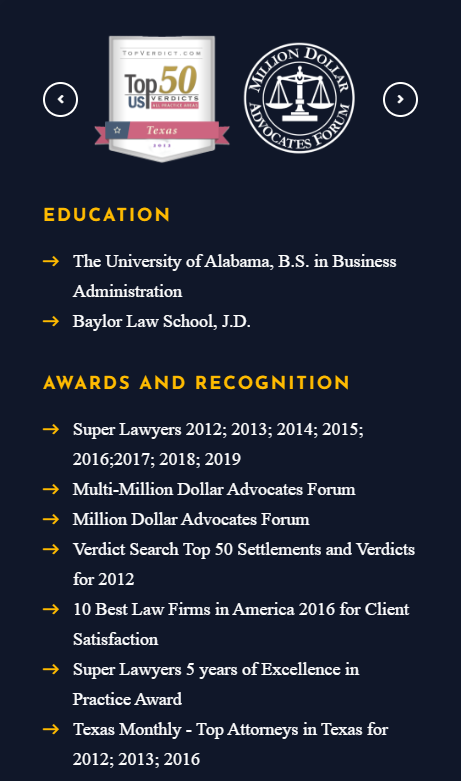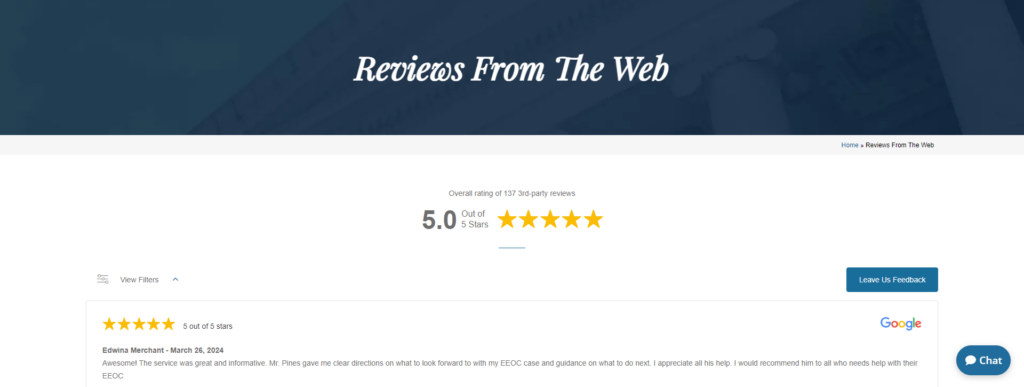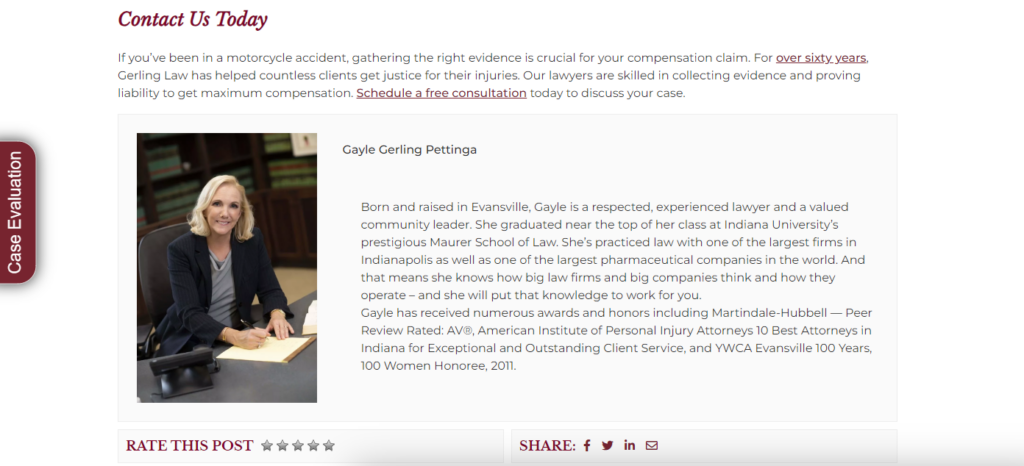While Google likes to keep algorithm changes mostly secret, they do occasionally give businesses and marketers an olive branch. The most recent of these gestures is E-E-A-T and YMYL for lawyers.
While these principles aren’t new, they represent a significant shift in how law firm web content is evaluated by Google. Now it’s not just about what you know—it’s about how your experiences enrich your content.
For law firms, this evolution in Google’s guidelines presents both challenges and opportunities. It requires attorneys to not only to showcase the depth of their knowledge and the breadth of their experience in ways that resonate deeply with clients, but also to do so in a way that satisfies SEO. In markets with high competition, that takes an incredible balancing act.
So how can law firms meet these standards?
All in all, E-E-A-T comes down to one thing: trust. This means that your content needs to establish your firm as a trustworthy source of legal information. To do that, it’s important to understand the components of E-E-A-T and how to implement them into your current marketing strategy. We’ll also take a look at why having a YMYL designation presents a unique opportunity for attorneys looking to market themselves.
What Is E-E-A-T?
E-E-A-T stands for Experience, Expertise, Authoritativeness, and Trustworthiness. In reality, the concept behind E-E-A-T has been around since 2014, just without the first E. Google first introduced it in its Search Quality Rater Guidelines to help actual humans review the quality of pages that appear in the SERP. Essentially, these guidelines help Google evaluate the effectiveness of its algorithm updates. While they have no actual bearing on how Google’s algorithm ranks content, they do seem to guide how Google alters its algorithm.
Well, if it doesn’t directly influence ranking, why should law firms care?
Because your users do. Ultimately, the goal of E-E-A-T guidelines is to help businesses provide useful, human-friendly content rather than just writing for the search engine. E-E-A-T for law firms is no different.
Experience
This is the new kid on the block. Experience refers to the personal, tangible connection the author of the content has to the subject. For law firms, this may be an attorney’s personal experience with real cases and their outcomes. Typically, law firm web content establishes experience by mentioning case results from an attorney’s actual clients.
Expertise
The role of expertise in E-E-A-T and YMYL for lawyers is to demonstrate your legal acumen. Google isn’t just looking for content; it’s looking for content crafted by those with a deep understanding of their field. For attorneys, this means showcasing your education and other qualifications in your bio and within content.
Authoritativeness
Authority refers to your digital reputation. Are you recognized by peers and clients as a leader in your area of law? If so, your overall content should reflect that. Generally, authoritative content is something that is frequently cited, shared, or respected. This is why many firms opt to share their content on well-known sites that link back to their website—think guest posts or news articles on Forbes or the Wall Street Journal.
Trust
This is the cornerstone of any law firm’s online presence. Your content must not only be accurate, but also convey a sense of security and reliability to your audience. You build this trust through your experience, expertise, and authoritativeness, as well as factual information. A good way to do this is to cite actual statutes, legal cases, and statistics.
Why Is Google Using E-E-A-T to Evaluate Pages?
Google’s mission is to organize the world’s information and make it universally accessible and useful. E-E-A-T helps Google achieve this by ensuring that the highest quality content, particularly in YMYL (Your Money Your Life) categories like legal services, rises to the top. It’s about creating a safer, more trustworthy web for users, where expertise and factual accuracy are paramount.
Why E-E-A-T Is a Boon for Law Firm Web Content
For law firms, E-E-A-T isn’t a hurdle—it’s an opportunity. It aligns perfectly with the intrinsic values of the legal profession and, consequently, law firm marketing in general. By adhering to E-E-A-T principles, law firms can not only improve their SEO performance, but also strengthen their brand, build client trust, and establish a competitive edge.
Part of the reason is that Google holds legal content to higher standards than other content. This is because legal content counts as YMYL. It’s a term used by Google to describe web content that, if presented inaccurately, untruthfully, or deceptively, has the potential to significantly impact users’ health, happiness, safety, or financial stability. Legal advice or information that could impact the reader’s financial status, rights, or responsibilities falls squarely into the YMYL category. This includes information on divorce, child custody, wills and estates, immigration, personal injury, wrongful death, business law, intellectual property law, and criminal law.
5 Ways of Implementing E-E-A-T and YMYL for Lawyers and Their Firms
While Google’s E-E-A-T principles offer a roadmap for law firm web content, the real magic happens when you implement them in a way that transforms your online presence. From showcasing qualifications to leveraging client testimonials, the best strategies are designed not only to align with Google’s guidelines, but to fundamentally enhance the way clients perceive and engage with your firm online. Let’s explore how you can turn these principles into practice and set your firm apart.
1. Highlight Your Qualifications When Relevant
Don’t be shy about your achievements. Whether it’s your law degree, bar membership, or notable cases, your qualifications bolster your expertise and authority. Each attorney at your firm should have a comprehensive profile on your website highlighting their education, years of practice, and any awards or recognitions. You can include them in a sidebar like the example below or just include it in the bio itself.

Another underrated way to showcase your qualifications is to share detailed case results that demonstrate your experience and success in specific areas of law. Be sure to include information on the challenges faced, strategies employed, and outcomes achieved, while respecting client confidentiality.
2. Make Sure Your Content Is High Quality and Helps the User
Law firm content should be informative and well-researched, and it should directly address the needs and questions of your audience. It’s not just about what Google wants; it’s about what your potential clients need. The decision to hire an attorney, for any reason, is difficult. So your content should reflect the gravity of that decision. This is of the utmost importance in E-E-A-T and YMYL for lawyers.
A good way of doing this is by addressing common client questions through blog posts, FAQs, and videos. The goal is to directly address the concerns and needs of your potential clients, providing them with valuable and actionable information. For example, if they need to know about the statute of limitations for car accidents in their state, give them a direct answer. Then, go into more detail about circumstances that might toll the statute of limitations and why it’s crucial to meet the deadline.
Related: How to Design Your Law Firm’s Blog Posts for Maximum Impact
However, don’t get carried away with legalese. Remember that your audience (in most situations) doesn’t have a high degree of legal knowledge. They want answers in clear, accessible language. This approach helps build trust and positions your firm as a helpful resource.
3. Showcase Client Testimonials and Reviews
Positive feedback from past clients not only demonstrates your ability to deliver results but also builds trust with prospective clients. To help build that trust, you should dedicate a section of your website to client testimonials and reviews. Positive feedback from past clients can significantly enhance your firm’s trustworthiness. Make sure to update this section regularly with new testimonials.

Additionally, you should encourage satisfied clients to leave reviews on third-party sites like your Google Business Profile, Yelp, and legal-specific directories. Positive reviews on these platforms can improve your firm’s visibility and credibility.
4. Include Your Bio in Blog Posts and Articles
A bio isn’t just a footnote; it’s a testament to your expertise and experience. It connects the content back to a real, credible source. Instead of giving your blog posts an anonymous author, create a blog profile for each attorney at your firm that displays an author box at the end of blog posts. Here’s an example from one of our clients.

This should include a brief bio, a professional photo, and links to the author’s full profile on your website. It personalizes the content and reinforces the author’s experience and knowledge. Additionally, your attorneys should author articles or blog posts in their areas of focus.
5. Link to and From Your Profile for Legal Awards or Directories
Links to awards and other legal membership profiles serve as digital proof of your authority and standing in the legal community. Without highlighting them, it’s difficult to establish authoritativeness with your law firm web content. If your attorneys have awards or listings on reputable legal directories, prominently display them on your website and link to them in the attorney profiles. Encourage your attorneys to participate in legal associations and contribute to their publications and events. Linking to these activities from their profiles can further enhance their authoritativeness in the field.
E-E-A-T Should Be the Backbone of Website Content for Lawyers
Remember, the goal of E-E-A-T and YMYL for lawyers is to ensure that users are getting high-quality, reliable, and useful information. This is especially important for law firms to remember since Google holds legal content to an even greater standard. For this reason alone, E-E-A-T should be the foundation upon which law firms build their online content strategy. By focusing on these principles, law firms can ensure that their web presence not only meets Google’s standards but, more importantly, meets the needs of their clients.
